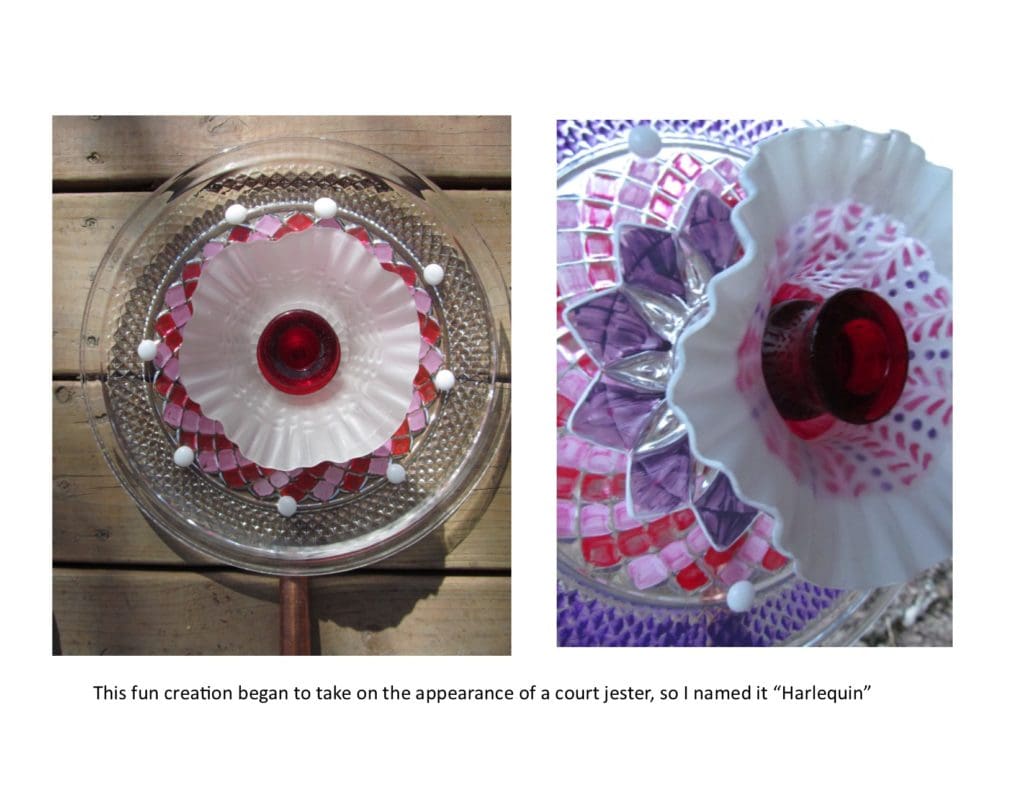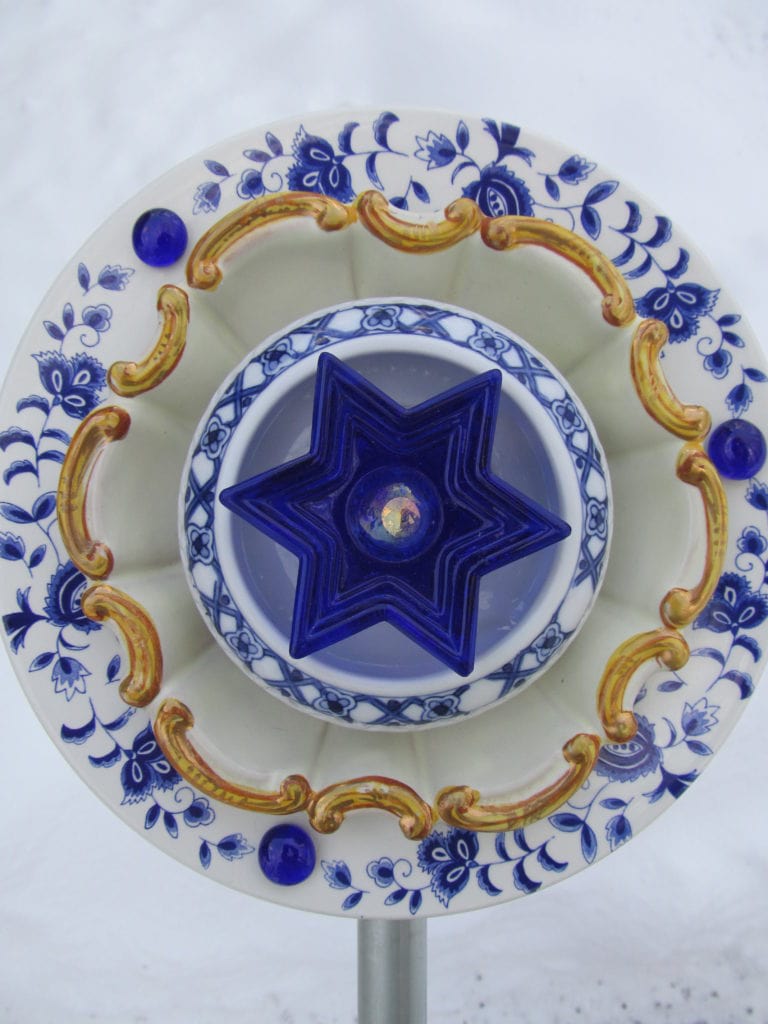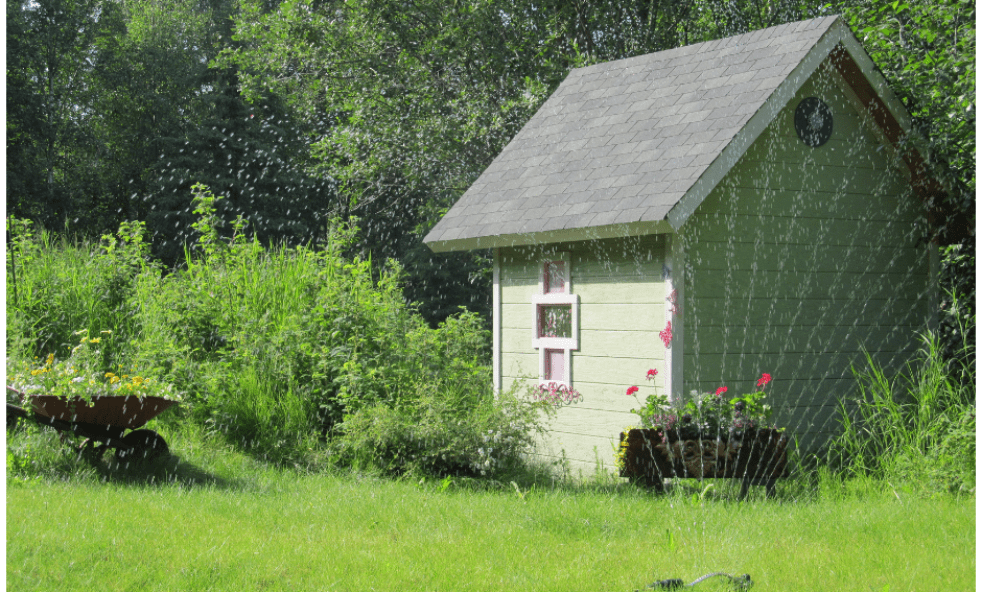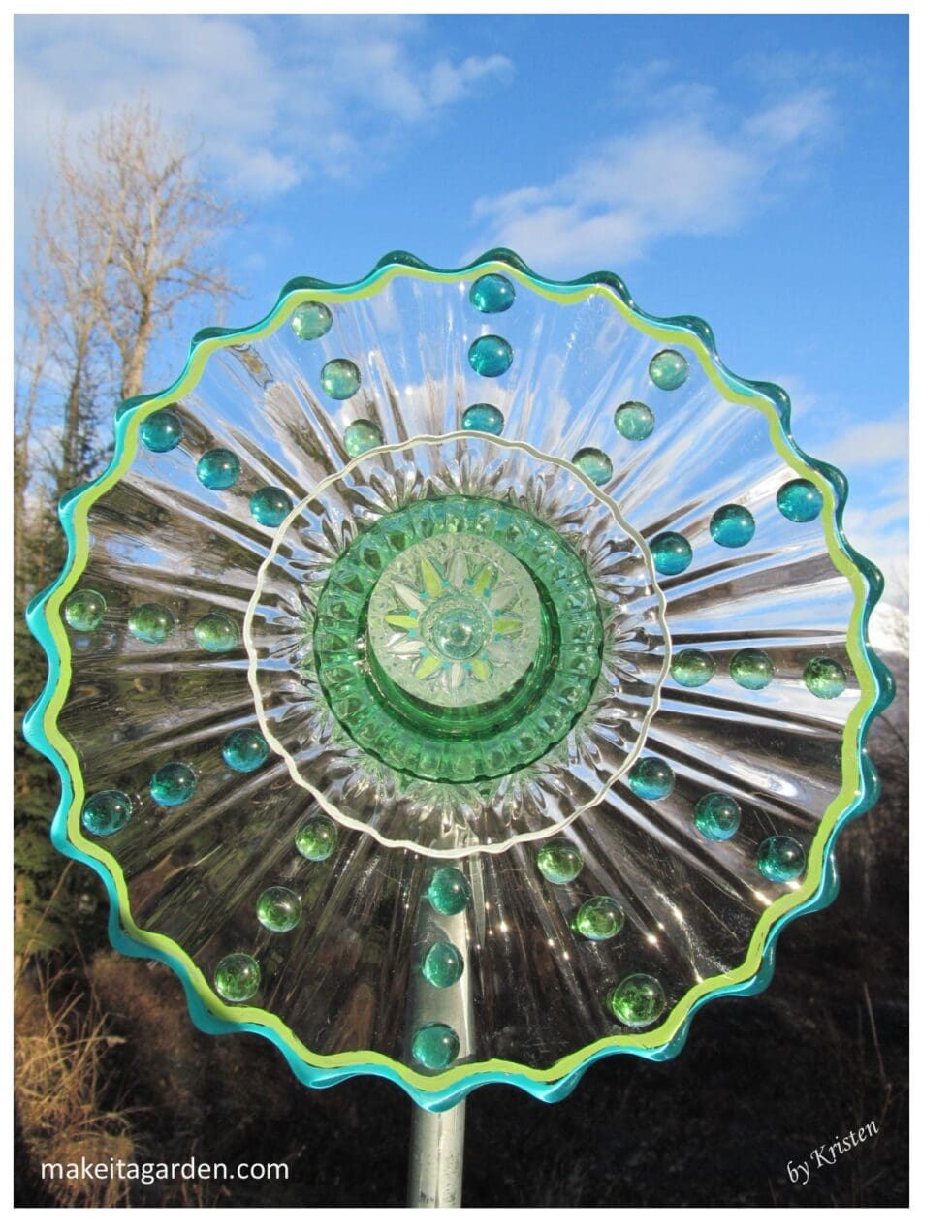
There’s something uniquely captivating about dish flowers. Also called plate flowers, sun catchers or garden art flowers. Whatever you call them, they are one of the most interesting phenomena in recent years to ever grace a garden. As sculpture, which they truly are, dish flowers bring a delightful sense of whimsy wherever they are ‘planted’.
Part of the attraction is that dish flowers are distinctly handmade, not massed produced. They’re as unique as snowflakes. When it comes to yard and garden art, it means having an original. Your neighbor will never have one just like it. Even though the same old dishware appears on the shelf of thrift stores and flea markets across the country, the combinations of color and style are virtually limitless.
Don’t take my word for it, come see our gallery of stars!
These are some of my favorite dish flower creations. I’ve put this together for your enjoyment, but also hoping it will a source of ideas and inspiration for making your own.
Dances with Dish Flowers

Painted glass dish flowers
Painting adds color and definition to clear glassware. Otherwise, a glass plate isn’t much more than a window. It wouldn’t show up very well in the garden. You can learn how to paint on glass with this article from Make it a Garden: Link to it HERE. It covers the specific type of paint to use, the curing process, some simple paintbrush patterns and other great tips for beautiful, painted glass dish flowers.








How are they attached to the post?
If you’re like most people, you’re probably wondering how they are attached to the post? If you’re familiar with dish flowers and have seen them at craft shows or local fairs, then you know the artists that make them may use different methods. Make it a Garden uses the drill method because we believe it’s more secure considering the weight of the plates.
The drill method means that a small hole is drilled through the large, back plate. A specialty drill bit is used to do this so the plate doesn’t break. Next, a hole is drilled through a metal pipe and the plate is securely attached to the pipe with a sturdy machine screw. You can learn more about this technique from our web site by clicking HERE.

















Thanks for visiting

As you can see, just like snowflakes, no two dish flowers are alike. The sheer volume of plates and other dishware out there in the world is mindboggling. Then, add in the artist’s imagination, and you’ve got the recipe for a lot of whimsy in the garden.
I hope you’re more interested than ever in making some for yourself, and that this little gallery has been a source of inspiration and ideas. I specifically selected these glass and ceramic dish flowers to relay a sense of color, patterns, styles and the types of combinations that you could use to make your own. So release your imagination and have fun.
Finally, check out the rest of the Make it a Garden blog. If you like this kind of stuff, you’ll love being a part of our community of garden and art lovers. Scroll down just a bit to sign up. You’ll receive “10 Artistic Ways to Make Your Yard and Garden Beautiful”, FREE!
Thanks for stopping by and have a wonderful time making your garden a special place!
More Garden Art Crafts to make:
Best Glues to use for Garden Art
How to Make a Pretty Birdbath from Dishes
Make a Bird Feeder from Teacups
The form you have selected does not exist.


Kris, you offer so many cool ideas for dish art! I don’t remember if I saw your “Everything but the Kitchen Sink” flower before, but it’s neat that you’ve painted and used the sink plug! Awesome way to save items from the landfill!
Thank you for those kind remarks. The dish flower you’re referring to was fun to make for exactly that reason! I actually found the sink strainers at a thrift store. Most people see them as strainers…I saw them as flower parts. That’s the difference. I’m so glad you enjoyed our little photo gallery.
I I’d like to know how you attach the leaf
Thanks for the question! The way I do it (just me) is to use a metal mending brace/bracket which is attached to the post with a bolt. And either glue the leaf to the metal piece or drill a small hole thru the leaf and attach it to the bracket with a short bolt and nut. That way, the “leaf” is attached to the bracket and the bracket is attached to the post. I wrote a blog post about this technique w/ photos which might make it easier: https://makeitagarden.com/how-to-add-a-leaf-to-your-dish-flower/ Hope this helps ~Kristen
Loved the very clear explanation of ideas! From the glues to construction, I think, even I, could possibly do this!! I saw on some of the pics there were leafs added. I have a leaf to put on mine but would like a bit of instruction. (I saw that eye roll…🙄) I see a screw in the leaf, but to what and how does it attach? Thank you ever so much, Betsy
Thank you for your kind remarks! I’m glad it came across as a clear explanation. I find it a bit challenging to put my process into words. I really have to think about what I do. So I greatly appreciate your feedback (grin). Here is how I do the leaf. I use a short straight metal joiner…the one with 4 holes. I drill a hole in the metal post and screw the joiner to the post with machine screw and nut. I used to glue a leaf to the joiner, but it would always come loose. So now I use a ceramic leaf that I can drill. I drill a hole thru the leaf and insert a super short bolt and nut to affix the leaf to the joiner, then screw the joiner to the post. If you are interested I have a full tutorial on how I make my dish flowers on the site as well. Hope this is helpful! Kristen
I have all the supplies I need to make some of these flowers. I have already made two but love your art and want to model some of mine after yours. Question: Do you ever paint on the back of a plate that has distinctive markings (this is for clear glass), such as etched leaves, etc? I wondered what the difference would be if I did it this way (I painted on the top of the plates last time). Thanks!
Thanks Debi, Great to hear from you! I’m so glad you’re making your own dish flowers! Honestly, I don’t think it matters what side of the glass you paint on. What’s more important is to use high gloss enamel paint and to make sure it’s fully cured before putting it outside. I bake my painted plates in the oven to speed up the process, as noted in the article. Both sides of the glass will be exposed to the weather…so it shouldn’t matter. The gloss dries super hard and you’d have to use a razor blade and really scrape to get it off, which makes it the perfect stuff for garden art. You can mix paints, too for different shades of color. Have fun!
Beautiful and so creative! I also make these flower garden plates. I enjoy the hunt for unique inventory and of course the creating. I sell at a few craft shows but have not been successful in selling on a continues basis. Any suggestions!
Thank you
Cynthia
Hey fellow artisan! Thanks for dropping a line. I, too sell mine at craft shows and wrote this article for sellers https://makeitagarden.com/how-to-sell-your-dish-flower-art-with-confidence/. But, like you, have difficulty selling on a continued basis. I have a couple good shows a year and have to be content with that. Part of the problem for me is that in my state (Alaska), we don’t have the market as down in the “lower 48” as we say. So it kind of depends on your area, too. Doing lots of shows with few or no sales burns up a lot of time and energy. Dish flowers are still very popular, but they appeal to a specific audience. The trick is to find the shows where you audience is…where there are gardeners who love whimsical re-purposed, and decorating their gardens with pretty things. That might mean trying for bigger shows where you know people come to buy and not just look. End of Summer/Fall is a slow time as the garden season winds down and there’s less interest in buying garden stuff. But try again during the holidays, as dish flowers make great Christmas gifts. Try to narrow it down. Is it competition? Too many others selling the same thing? Low turn out? Not much interest? (believe it or not, there are folks who do not know what dish flowers are!) What have you heard people say when they come by your table/booth and look? Comments are a good source of information that could give you valuable insights. I have sold things on Facebook marketplace and have sold things in shops and greenhouses on commission. You might try that as well. One final thought…low sales could have something to do with the economy, too. When food, gas prices are high, people tend to conserve on their spending. Finally, you didn’t say how long you’ve been selling? Sometimes it takes a season or two for people to come to know you and your artistry; at least it did for me. Just don’t give up, Cynthia! Hopefully this was helpful. Feel free to reach out anytime. ~Kristen
I have been making garden flowers for years — over 650 made. I sell them at craft shows in the spring through autumn. I use E-6000 and I glue a wooden block to the back of my flowers. I drill a hole in the block and insert a piece of rebar into the hole — and the other end goes into the ground. The flower can be removed and stored during the winter (I live in Michigan) but I have left many outdoors year-round without a problem. I suggest to buyers that they can also use them for centerpieces during the winter. My flowers are high-end. I have done well using more expensive materials but I have found that during and since the pandemic the pieces I use have really increased in price. They have also been harder to find. I have not tried to sell my flowers on a website or Etsy because the postage is prohibitive.
I enjoyed reading your article and look forward to continuing.
I so enjoyed hearing about your crafting business and dish flowers! It’s always interesting to see the different construction methods in use, and what glue others use. I also do not sell mine on-line because of shipping costs. (I’m in Alaska!) And cost of materials have gone up for me, too! I’d love to stay connected!